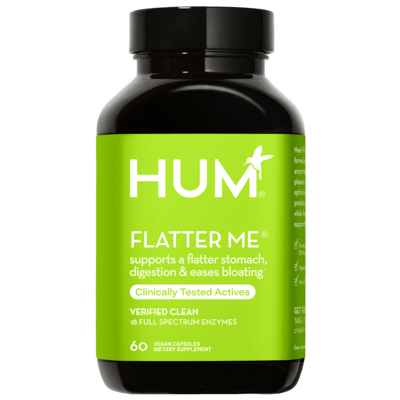Today we’re advising on an issue that is all too common and uncomfortable. Here are our five nutritionist-approved ways to stop feeling bloated, and expert advice on how digestive enzymes can help.
Why You May Feel Bloated
Abdominal bloating is one of those feelings you recognize best once you’ve had it. A buildup of gas in your digestive tract leads to the discomfort of feeling too full, swollen, and weighed down. Here are a few common causes that lead to feeling bloated.1. Overeating
Overeating is one of the most common causes of bloating, and closely linked is eating too quickly. The old adage that it takes your stomach time to tell your brain it’s full is actually true. In fact, it takes approximately 20 minutes. Eating quickly leads to overeating, which can often result in that bloated feeling.2. Bloat-inducing foods or a food intolerance
High-fiber foods such as whole grains, some raw veggies, and legumes contain an indigestible carbohydrate that can cause gas, bloating, or constipation. In addition, many processed foods contain the natural sugar fructose, which is difficult for many people to digest. Some people feel bloated more often and more easily than others, and this can be due to a food sensitivity or intolerance. Common gut sensitivities include lactose (milk sugar), which makes consuming dairy products tough. Gluten can also be a concern as it consists of a densely packed protein. Naturally occurring protein-digesting enzymes have difficulty breaking this compound down. It’s why cutting gluten out of your diet can have great digestive benefits for some people.3. Premenstrual bloating
A hormonal imbalance can also lead to water retention, which is why bloating and gas are common symptoms of PMS. A rising level of hormones (including progesterone) occurs in the last two weeks of the menstrual cycle. It can possibly slow the digestive process and prevent the GI tract from emptying at its usual pace. This occurrence can lead to more issues of gas or constipation.4. Aging Body
As we age, we become more vulnerable to vitamin and mineral deficiencies that can contribute to health concerns and digestive troubles. For instance, older adults experience a decline in enzyme production that works to break down foods, absorb nutrients, and optimize digestion.5 Ways To Stop That Bloated Feeling
Here are some tips to stop feeling bloated and ramp up a healthy digestive process.Practice this…
As mentioned, eating quickly leads to more swallowed air, which means more gas in the digestive system. This buildup of gas is a major cause of bloating and digestive discomfort. Practice eating smaller portions while chewing more slowly and mindfully for multiple benefits. A smaller portion size has even been linked in a HUM study to a smaller waist size!Eat this…
Potassium is a key nutrient to help ease your digestive woes. Salt is a leading culprit of bloating because it retains water, preventing it from flushing out waste. This is why potassium-rich foods like bananas and oranges help balance sodium levels and reduce water retention. Other key nutrients beneficial to bloating can be found in some fruits. These naturally contain enzymes that help your body absorb nutrients and breakdown a food into its nutritional, digestible components. You can find these enzymes in tropical fruits like papaya, pineapple, and grapefruit. Some herbal remedies are also traditionally used to support the flow of digestion, including ginger, lemon, and cinnamon. The use of these herbs are common in Eastern & Ayurvedic practices to soothe the colon and provide relief from indigestion, gas, and bloating.Drink this…
While not the most surprising of tips, water is necessary to keep your digestion running smoothly and flush out waste. Less well known, however, is that while eating, it’s best to avoid ice water and go with room-temperature water instead. Optimal digestion works at a steady 100 degrees Fahrenheit. When we consume ice water, the body works overtime to warm it. When it comes to your drink of choice, to avoid bloating you also want to skip the soda—even the diet variety. The common natural sweetener sorbitol cannot be absorbed by the GI and instead ferments in the colon, producing bacteria and gas that makes the compound a common precursor to bloat.Ditch this…
Stress can wreak havoc on the digestive system, slowing and even stopping it entirely to focus on the stressors at hand. Indigestion and inflammation in the gut are natural byproducts. To ditch the stress, a little cardio can go a long way. Exercise is known to boost endorphins, improve your mood, and reduce symptoms of depression or anxiety. Cardio will also give your digestive flow an extra kick as it helps pass gas through the colon.Supplement with…
When it comes to supplementation for bloating, full-spectrum digestive enzymes such as HUM’s Flatter Me provide essential benefits. To give you greater insight into just how digestive enzymes work, meet Jess Nelson, RDN, CPT. With a special knowledge base and interest in functional gut health, she says, “Healthy individuals may benefit from digestive enzymes when they experience symptoms such as bloating and gas, or uncomfortable fullness two to four hours after eating meals. Also, vegans and vegetarians may benefit from digestive enzymes to help break down the large portions of fiber coming from beans and vegetables in their diet. Taking digestive enzymes before you eat will help your body digest and absorb the nutrients you need for energy production and cellular growth for overall optimal gut health.”The Expert View on Digestive Enzymes from Jess Nelson, RDN
Digestive enzymes help break down the food we eat into smaller components of sugar, fiber, carb, fat, and protein to make that food more easily absorbed in the digestive tract. Our bodies naturally make several digestive enzymes, such as lactase, which helps breakdown the milk sugar lactose. But sometimes our bodies don’t produce enough, such as with those who have lactose intolerance. Although our bodies make several digestive enzymes naturally, we’re lacking enzymes to break down plant walls like cellulose, pectins, and resistant starches known as fiber. Many fruits and vegetables have digestive enzymes, but the concentration of enzymes in the produce decreases over time or as the produce ripens. For individuals who have medical malabsorption conditions, their bodies have stopped producing enzymes. It’s always wise to consult your primary care physician or gastroenterologist before taking any type of supplement, especially those containing digestive enzymes, if you suspect you have serious complications with your GI tract. When looking for the best digestive enzyme supplement for you, look for a brand that provides a broad spectrum of digestive enzymes for improved food breakdown and nutrient absorption. Ideally, the digestive enzymes should be in a gel-capsule form so that your body can dissolve it more quickly. For digestive enzymes to be most effective, they should be taken before a meal to give the supplement enough time to dissolve.More like this









